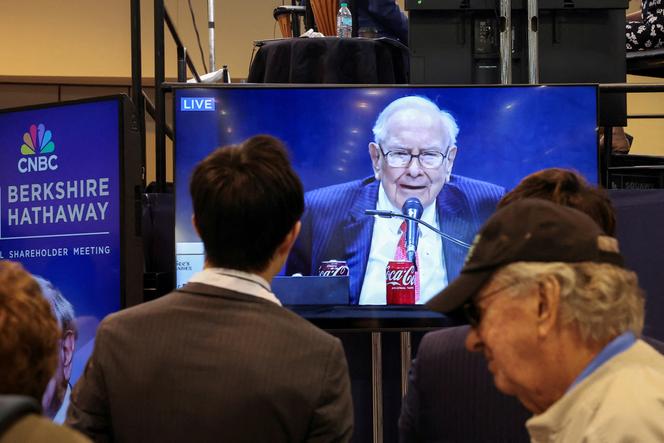


It was a packed and buzzing room. The star had just announced that it was his farewell performance. The audience stood up and cheered, some fans with tears in their eyes. The scene would be almost conventional if the artist on stage were a singer, but the man with the gravelly voice is in fact a CEO, no doubt closing what is likely to be the last "Woodstock of Capitalists."
Warren Buffett, 94, surprised his shareholders at the very end of the always colorful annual general meeting of Berkshire Hathaway in Omaha, Nebraska. On Saturday, May 3, Buffett announced his intention to leave the company he has led for 60 years by the end of 2025. The world's most respected investor will hand over the reins of the conglomerate (insurance, rail, aerospace, etc), which boasts a massive stock portfolio, to 62-year-old Greg Abel, Canadian by birth, head of non-insurance activities and designated successor since 2021. Abel will have the monumental task of finding the right opportunities to invest the cash mountain – $347.7 billion at the end of March – that is accumulating in Berkshire Hathaway's coffers, representing 30% of its market capitalization.
For 10 consecutive quarters, Berkshire has been selling more than it buys on the financial markets. Buffett's mistrust of the stock market, which he considers overvalued, did not begin with the trade war launched by US President Donald Trump. But the investor is profoundly opposed to it. "Trade should not be a weapon," reiterated the "Oracle of Omaha" on Saturday, highlighting how wanting to crush other countries can prove to be a dangerous game in an already unstable world.
Buffett was the first, however, to worry about the US trade balance deficit. In 2003, he sounded the alarm in a lengthy op-ed published in Fortune magazine, in which he condemned the impoverishment of the United States for the benefit of foreign countries, a sentiment that Trump would not have denied. His solution at the time was to issue "import certificates" to exporters, equal to their sales of goods outside the borders, which these companies could then resell either to American importers or foreign exporters. This is somewhat similar to CO₂ emission quotas.
It was a way of balancing the system as a whole, rather than seeking at all costs, as Trump does, to achieve perfect equality in imports and exports of goods with each trading partner or in a given product category, such as steel or cars. It was somewhat "gimmicky," the sage acknowledges today, referring to his 2003 proposal, even if it is still "better" than the tariff standoff. In other words, like striking a match in front of a powder keg.
Translation of an original article published in French on lemonde.fr; the publisher may only be liable for the French version.
